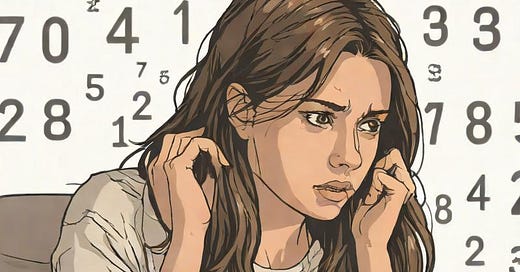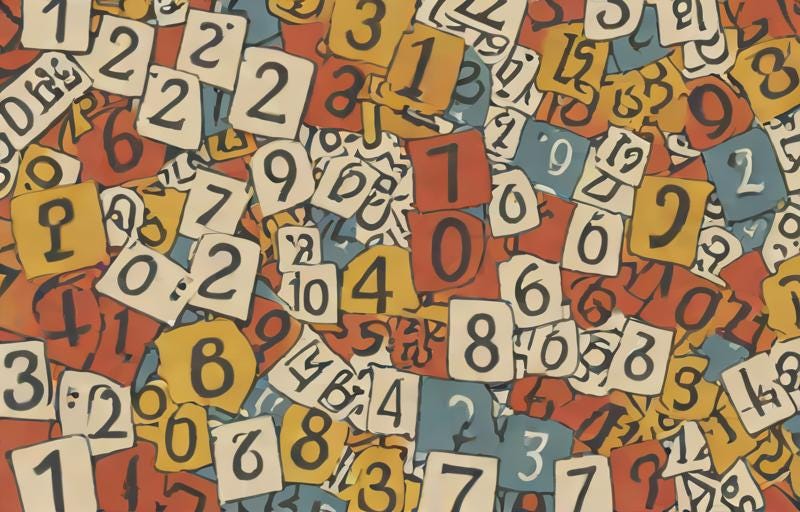Hello, Hindsight: The revelatory process of reliving life post-diagnosis
How a new lens on your life makes some things more clear, and others much darker
The Baader-Meinhof phenomenon (aka the frequency illusion) is that thing when you buy a black Honda Civic and then all of a sudden the roads seem to be full of Black Honda Civics, merely because your brain has now been primed to look for black Honda Civics. They were always there, but you just weren’t really paying attention before.
Getting a late-in-life diagnosis of autism is kind of like that, but more painful and profound: A Baader-Meinhof identity crisis.
Instead of seeing a certain make and model of car at every turn, or reading that word you just learned multiple times the next day, all of your memories and life experiences come into sharper focus through a completely new lens, which can give them both darker or deeper meaning.
In some cases, my newfound understanding of my autistic mind allows me to make sense of things I couldn’t in the past.
Like, that one job where I never quite fit in. It wasn’t that I wasn’t friendly or helpful or good at my job. But I was tasked with pointing out and fixing operational inefficiencies, and I can now see how that work might inadvertently make some of my colleagues look bad and come to resent me. I wasn’t inherently unlikeable, just put in a tough position.
Or that one terrible person that I dated briefly. I am glad I was able to escape relatively quickly and unscathed, because I can now see I was a victim of an expert manipulator who was gaslighting me into ignoring a veritable Macy’s Thanksgiving Day Parade of red flags.
The newfound clarity that comes with an autism diagnosis is nice in some ways. It silences lingering doubts and closes open loops.
But many of those lightbulb moments illuminate things that you’d rather not look at.
I think back on my lifelong struggle with Math.
I remember the anxiety of bringing home report cards from 8th grade on, because I’d inevitably have A’s down the line, and then have to explain why I couldn’t manage better than a C or a D in math. (And that’s if I was lucky.)
If I could get As in my other classes then I must be a smart kid, I was told.
But I just wasn’t applying myself in Math... Wasn’t asking for help. Wasn’t trying hard enough. Wasn’t focused.
Except I WAS.
I spent free periods getting extra help from classmates, came in early to review homework with my math teachers, attended outside tutoring, and even traded in my GameBoy for one of those handheld study devices from Kaplan or Princeton Review packed with practice equations. (I don’t think you can be called a “nerd” if you’re still failing, but that’s certified geek behavior, at the VERY least.)
I barely passed pre-algebra. And algebra. And precalculus. I retook the math section of the SAT three times and STILL couldn’t get above 47%. My first semester of college, I had to Withdrawal/Fail from my required Intro to Statistics course. I only managed to pass on my second attempt due to the mercilessly low standards of the checked-out teacher assigned to my summer class.
In my sophomore year of high school, though, I managed to get an A+ in Geometry: A literal perfect score. I aced every test with ease, flew through my homework, and answered correctly when called on in class, much to the delight of myself, my parents, and my high school guidance counselor. Geometry made sense to me because I could picture it in my mind.
And while the difference between measuring shapes and making abstract numerical calculations was clear to me, acing Geometry only seemed to be further proof to those around me that I simply wasn’t trying hard enough in all the other math classes.
I just couldn’t seem to make sense of abstract numbers, no matter how hard I tried.
My first semester of college, I accidentally gave out my mom’s cell phone number instead of mine to several friends. (Yes, this was as embarrassing as it sounds.) I never memorized my 6-digit student ID number and didn’t have my SSN memorized until well into my 20s. Phone numbers, zip codes, PIN numbers, dates, appointment times… all of them seem to just disappear the second they hit my brain.
Meanwhile, I excelled in many other areas. I was always exceeding expectations for writing and reading comprehension, and I memorized non-numerical facts with ease. I naturally took on leadership roles in every activity I was a part of, was comfortable speaking in front of large groups, and led large complex projects both in school and at work.
But my inability to master mental math seemed to neutralize it all:
I wasn’t “successful,” but “successful despite my math scores.”
I carried the shame of my math scores like a scarlet letter, except it was a crimson F on my chest, instead of an A.
I now know that stark skill disparities like this are typical of many autistics.
Most folks are familiar with the stereotypical “non-verbal or dyslexic math savant” variety of autism, a la Rainman since that’s often what’s shown in the media.
That’s the thing about spectrums, though…
Turns out, you can also be the opposite.
👋 It’s me. Hi. I’m the opposite. It’s me.
Knowing what I know now, I can say with certainty that I should have been classified as verbally gifted1. I was reading at a 12th-grade level in 7th grade, got a 5/5 on the AP English exam, a near-perfect score on the writing/reading sections of the SAT, ACT and GRE, won college scholarships based on essays I wrote, picked up new languages with ease, served as the editor of 7 student publications over the years, took grammar classes for fun, and even got my Master’s degree in editing.
And my lifelong struggle with math wasn’t laziness or an inability to focus, but a textbook example of dyscalculia2, a learning disability that involves difficulty processing and retaining numerical information.
And while It’s nice to have that clarity now, it’s hard not to wonder how different my experience of school would have been if I had known this back then, if I had gotten my autism diagnosis sooner and had these skills and deficits treated as what they were.
Maybe I would have received accommodations in school that would have helped me learn differently, or perhaps I could have gotten permission to use a Geometry course for my college math requirement instead.
If nothing else, everyone around me could have adjusted their expectations to align with my disability. We could have celebrated my effort and praised my small victories instead of continuously pointing out the gaps in my abilities. I almost certainly would have been spared the humiliating portion of my graduate school interviews where I had to explain why I should be allowed into writing programs where I exceeded every admission requirement, except my score on the math section of the GRE.
Sure, I can look back now and feel better knowing that I tried my best. I can try to focus on being grateful that I had enough privilege to get extra help and to retake classes. I can attempt to focus on the fact that I managed to do as well as I did even with an undiagnosed disability. (You know, “successful despite my math scores.”)
But that doesn’t change the fact that I spent 31 years of my life believing (and at times being explicitly told) that I was lazy or stupid or broken because I couldn’t quickly and easily explain an “imaginary number,” or intuit the value of X or B, or accurately repeat a 6-digit security code I read in a text message 20 seconds earlier.
And that knowledge—that my autistic mind struggles to retain and process numerical information and abstraction—doesn’t get rid of the trauma response that causes me, to this day, to have to fight off a panic attack while trying to calculate a tip or do other types of mental math in front of people. (Please, don’t ask me to.)
This is part of why I’m so passionate about being open about my experience and raising awareness about how autism can present differently in girls and women.
It’s part of why I started The Late Diagnosed Diaries in the first place.
Because it might be too late for my SAT scores, but it doesn’t have to be too late for someone else’s. 💜
[Resources] So, you think you might be autistic?
One of my main motivations for starting The Late Diagnosed Diaries was to catch the eye and ear of undiagnosed Autistic women and pique their curiosity. In my wildest dreams, I like to imagine that I can help large numbers of undiagnosed Autistic women discover and better understand their autistic mind, ultimately leading them to live more accommodated,…








![[Resources] So, you think you might be autistic?](https://substackcdn.com/image/fetch/w_1300,h_650,c_fill,f_auto,q_auto:good,fl_progressive:steep,g_auto/https%3A%2F%2Fsubstack-post-media.s3.amazonaws.com%2Fpublic%2Fimages%2Fa0463ffc-e089-4920-b0b5-96c7b79f07b9_800x512)
Yes post diagnosis is just a cauldron of emotions. The joy and peace of “ugh I’m not broken” while simultaneously understanding and reliving every terribly horrible thing people have said to you
This resonates with me so much. Thank you for writing this post and helping to illuminate the sources of past struggles.